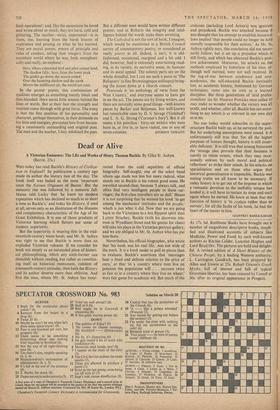Dead or Alive
A Victorian Eminence: The Life and Works of Henry Thomas Buckle. By Giles St. Aubyn. (Barrie, 25s.)
WHO today has read Buckle's History of Civiliza- tion in England? Its publication a century ago made its author the literary lion of the day. The book itself was hailed as the most 'important since the Novutn Organum of Bacon.' But the meteoric rise was followed by a meteoric fall. Maine told Lecky that 'he knew no modern reputation which has declined so much in so short a time as Buckle's,' and today his History, if used at all, serves only as an illustration-of the illusions and complacency characteristic of the Age of the Great Exhibition. It is one of those products of Victorian learning which flatters our sense of modern superiority.
But the superiority is wearing thin in the mid- twentieth-century wastelands; and Mr. St. Aubyn was right to see that Buckle is more than an exploded Victorian volcano. If we consider his book not simply as an outmoded piece of histori- cal philosophising, which any sixth-former can demolish without reading, but rather as constitut- ing itself an historical monument, redolent of nineteenth-century attitudes, then both the History and its author deserve more than oblivion. And first the man, whom Mr. St. Aubyn has resur- rected from the cold sepulchre of official biography. Self-taught, one of the select band whom age made not less but more radical, what stands out in Buckle is his robust good sense. He travelled second-class, because 'I always talk, and often find very intelligent people in those car- riages; the first-class travellers are so dull.' Hence it is not surprising that he wanted his book `to get among the mechanics' institutes and the people,' which is just what it did. Now that we are going back to the Victorians in a less flippant spirit than Lytton Strachey, Buckle (with his decorous mis- tress in Wyndham Street and his genius for chess) will take his place in the Victorian portrait-gallery; and we are obliged to Mr. St. Aubyn who has put him there.
Nevertheless, his official biographer, who wrote that 'his book was his real life,' was not wide of the mark. It is a book easier to pull to pieces than to evaluate. Buckle's assertions that 'marriages bear a fixed and definite relation to the price of corn,' or that 'in a country where men live on potatoes the population will . . . increase twice as fast as in a country where they live on wheat,' were fair game for academic wit. But much of the
criticism (including Lord Acton's) was ignorant and prejudiced. Buckle was attacked because it was thought that his attempt to establish historical laws implied 'that people could no longer be held morally responsible for their actions.' As Mr. St., Aubyn rightly says, this conclusion did not neces- sarily follow; but it set up a prejudice which is still lively, and which has obscured Buckle's posi- tive achievement. Moreover, his attacks on the methods employed by historians of his time, al- though well merited, were not well received. In the tug-of-war between academics and non- academics, the self-educated Buckle inevitably lost, as academic history, buttressed by German techniques, came into its own as a learned discipline. But three generations of 'arid profes- sionalism' (as Sir Maurice Powicke once called it) may make us wonder whether the victory was all profit, and whether, after all, Buckle has not some- thing to say which is as relevant in our own day as in his.
No one today would subscribe to the super- structure Buckle built up, as he surveyed the past. But his underlying assumptions were sound. It is unfortunately still true that 'for all the higher purposes of human thought, history is still miser- ably deficient.' It is still true that among historians the 'strange idea prevails that their business is merely to relate events, which they may occa- sionally enliven by such moral and political reflections' as strike their minds. In his attacks on specialisation and on those who argue that historical generalisation is impossible, Buckle was stating truths we all know to be necessary. If today history is to get out of the impasse in which a romantic devotion to the ineffably unique has landed it, it will have to retrace its steps and start again where he started. He knew at least that the function of history is `to explain rather than to narrate'; for all the faults of his book, he had the heart of the matter in him.
GEOFFREY BARRACLOUGH


































 Previous page
Previous page